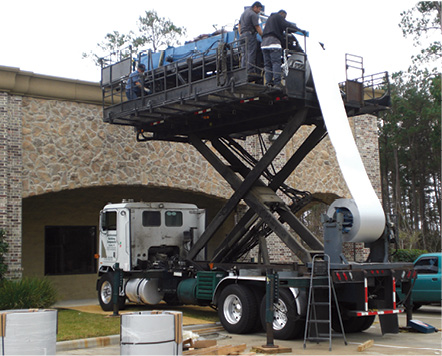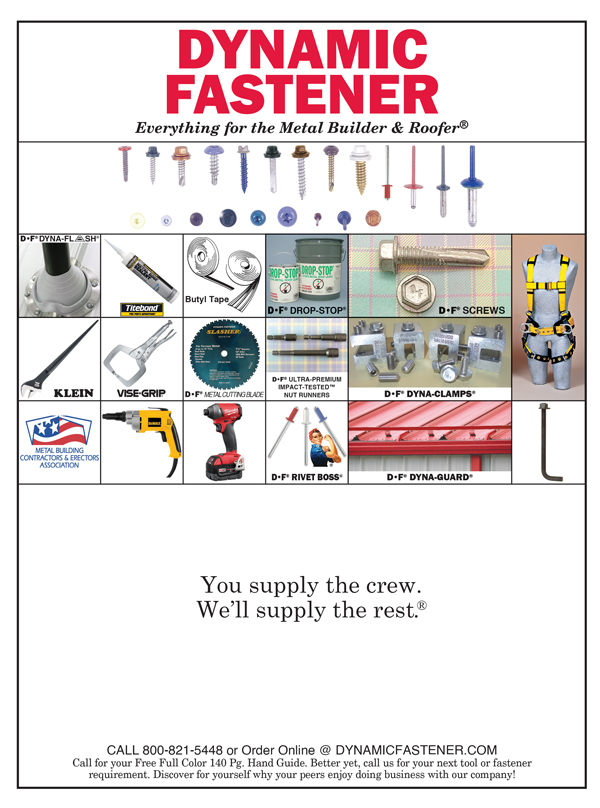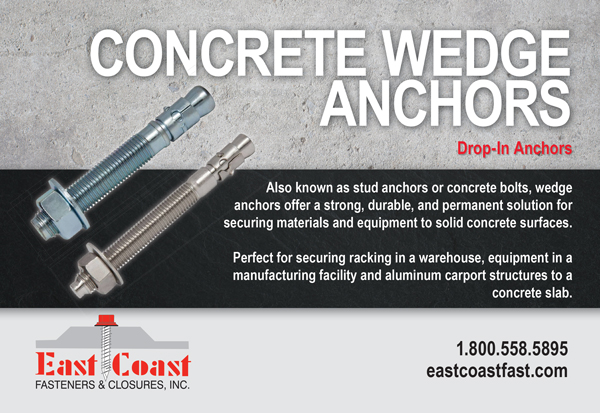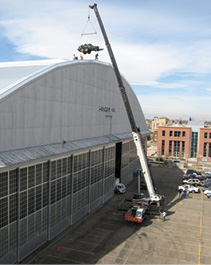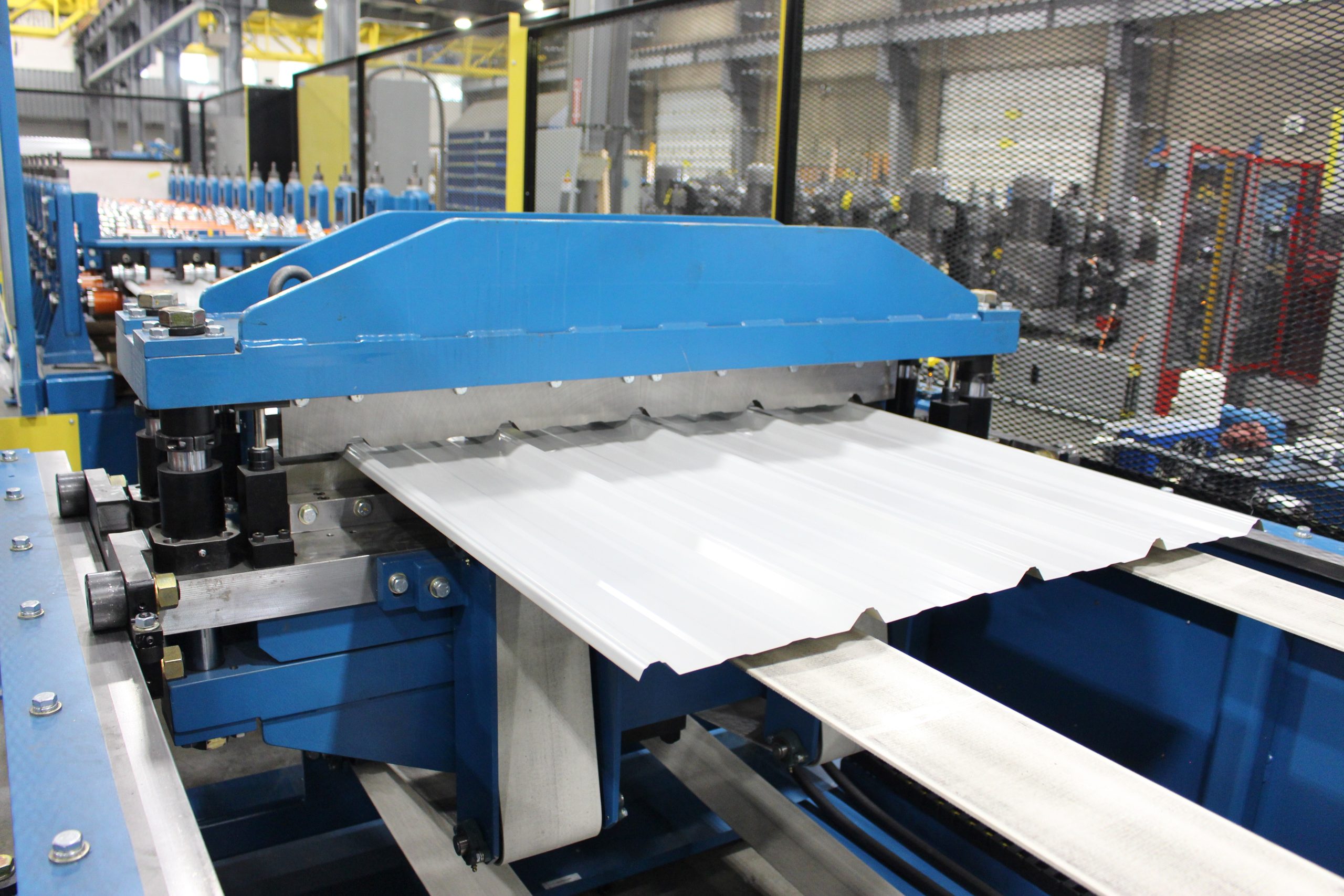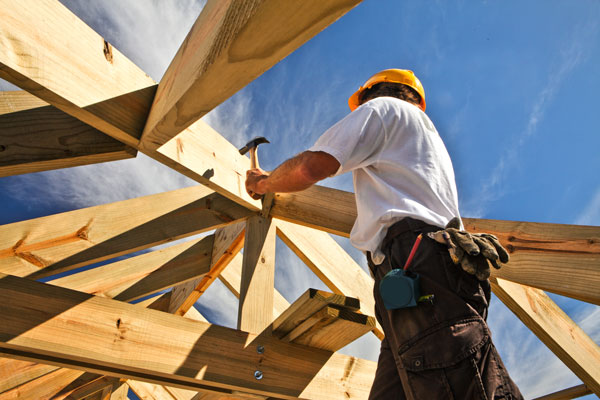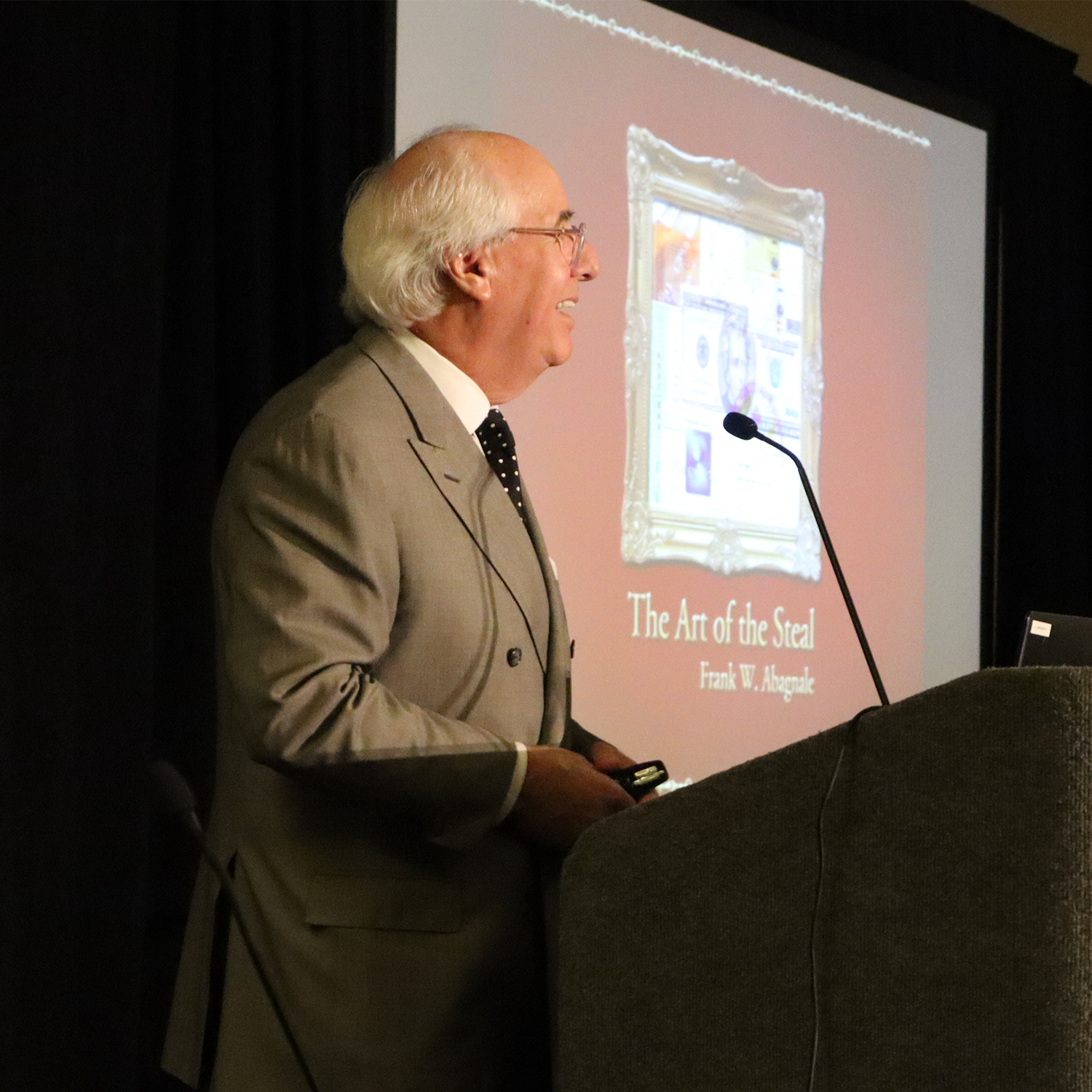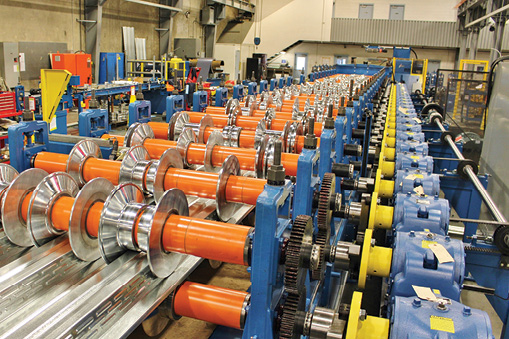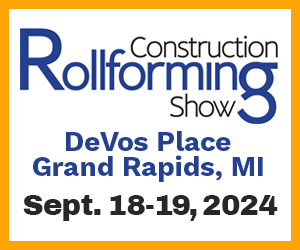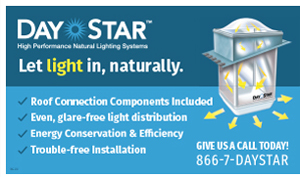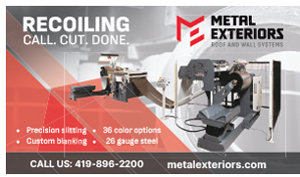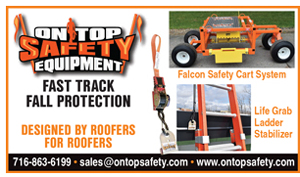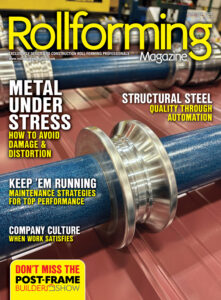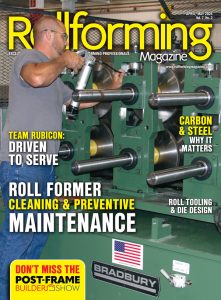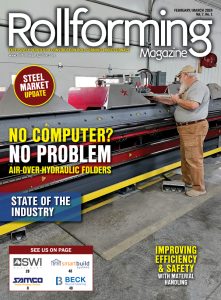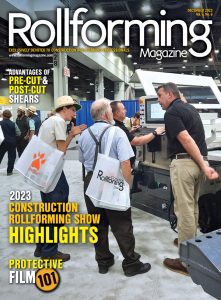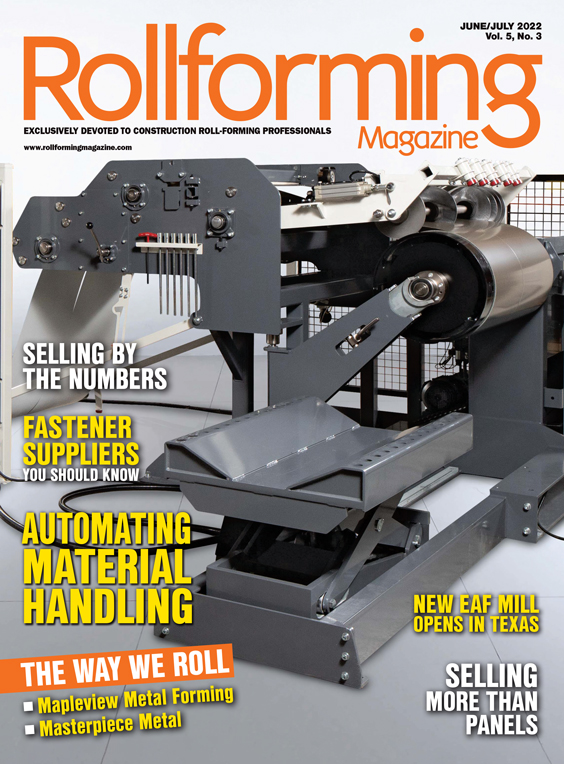Are you ready to roll your own metal roofing panels? Many in the industry think it makes sense.
More and more roofing contractors these days are answering “yes” to that question. Manufacturing independence, waste management, shipping considerations and other factors paint a compelling case for contractors looking to buy a roll former and produce their own panels. But it’s not that simple—additional manufacturing costs, employee training, warehousing and a different set of transportation considerations must be weighed before pulling the trigger on this very significant purchase and investment.
Mike Milliman of Rain Trade in Lake Bluff, Illinois, decided it was worth it. Rain Trade has been selling New Tech Machinery’s gutter systems for years and has had such a positive experience with their equipment, the company recently became a new distributor for New Tech’s roll-former equipment.
“There are so many benefits for companies to purchase their own machine,” Milliman says. “Just not having to depend on anyone else is a big advantage. It saves time as well as money.”
Ken McLauchlan, director of sales with Drexel Metals, headquartered in Louisville, Kentucky, agrees, and says it’s about controlling what kinds of projects you want to take on. “You can control your own destiny and have the flexibility of what jobs you can do—and be confident that you are putting out a better product,” he says.
For 40 years, Roll Former Corp., of Chalfont, Pennsylvania, has designed and developed custom machinery for companies looking for a roll-forming application. “We design our custom equipment from scratch and we offer about 25 standard products,” said John Dumke, director of sales and marketing for Roll Former Corp. Dumke says that roll forming has many cost advantages over brake forming and preformed panels, including:
• No expensive shipping and crating of long panels. Coils are delivered right to the shop or job site;
• No panel shipping damage and delays are minimal;
• Less labor and waste;
• The ability to work on your own schedule, not the factory’s; and
• Form perfect panels to any length.
Additionally, Bruce Pearson, with Zimmerman Metals, in Denver, Colorado, has been in the business for 45 years, and he says that you can reduce your cost of doing business by using a portable roll former in many ways. “On-site fabrication eliminates shipping damage, you don’t have to worry about packaging materials, sizing errors and the panels can be custom manufactured. Also, as you make your panels on site, you don’t have to worry that the manufactured panels will get damaged laying around on the job site,” he says.
Roll Formers:
In-House vs. Portable
Ready to roll your own? Your next decision will be to choose between the two distinct types of roll formers—portable and in-house machines. In-house machines are usually larger units designed and built for high-production rates. Portable roll formers are smaller for simpler transportation and tend to be more flexible in their ability to produce a variety of panel profiles.
For in-house manufacturers, you don’t have to keep your machine busy to justify its expense, as they are built for increased orders and high-production rates.
However, portable roll formers tend to save on transportations costs—they save on packaging and freight costs while giving the roofer the ability to reduce the time of a project, instead of ordering factory-formed panels. As an added bonus, on-site panel fabrication eliminates the possibility of shipping damage to panels, miscalculated sizing, etc. Also, on-site roll formers can produce panel lengths varying in size required by the specific roof, as they are not regulated by shipping rules.
What The Investment Costs
So you’ve decided to open up the checkbook and buy a roll former. Will it be worth their investment? Cost varies, and your priorities will drive just how large a check you will need to write.
“There’s the entry level and the commercial level. But having the flexibility and the ability to cut the middle man out may be beneficial to your business,” says Drexel’s McLauchlan. “The entry level roll former may start in the low $20,000 range, where the very specific commercial machines might be as high as $150,000. But being able to diversify your jobs will be worth the cost.”
There are a number of companies in the industry that will work with contractors on equipment financing. Another option would be to lease equipment. Leasing payments are much less expensive of the total purchase price of a roll former and it can be a pre-tax expense. Leasing also allows for upgrades and equipment add-ons.
According to Pearson at Zimmerman Metals, they train on maintenance and adjustment of their machines. “We provide training on all of our equipment. You can either do it on-site in our factory, or we will send one of our manufacturers out to you to do the training and it usually only takes one day. We don’t charge for this on any new machines that are purchased,” Pearson said.
Additionally, Dumke at Roll Former Corp., says they offer training as well. “We do this in two ways; you can either come to our plant to get the free training on your new machine or we send someone to your location for a fee. Either way, we will make sure that you know how to operate our custom machine,” Dumke said.
As with any significant purchase, a contractor looking to purchase a roll former should shop around, and consider not only the price but quality reputation, warranties and service. “Quality is the most important factor when choosing a roll former, as the machine will be an integral part of your business,” says Roger Geer, former COO of New Tech Machinery, based in Denver, Colorado.
Tom Laird, national sales manager of New Tech, says that it is important to keep in mind that the roll formers’ versatility and quality is extremely important, as the more versatile the machine is, the more jobs you can potentially bid on and land.
“There are single-profile machines as well as multi-profile machines, so make sure you get a machine that can grow with your business and will stand the test of time as well. New Tech Machinery offers one of the most comprehensive warranties in the business with three years on parts and labor (including electrical components), along with limited LIFETIME warranties on drive and forming rollers,” Laird said.
Additionally, Pearson with Zimmerman says to do reference checks. “It’s also important to know how long they have been building their machines; check to see if they offer training, see where they make their equipment. I personally prefer American made, but make sure it is a quality company with a quality product. We offer a three-year warranty on our machines, but we never have any problems. I built my first machine 29 years ago, and the owner today of this machine has only replaced one part in 29 years,” he said.
Always Evolving
Today, portable roll formers tend to be more advanced and use modern technology that can produce quality panels that are competitive with in-factory roll-forming machines. Portable roll formers can cut metals more quickly, without any waste.
Many roll formers sold today feature computer controllers software that offers users more options and benefits than in the past. Many offer proximity sensors, multiple-length memory storage, batch and length control, and some even recognize coil color for state-of-the-art user-friendly settings.
Another key distinction among different types of roll formers is multi-panel vs. fixed-panel machines. Users report that the multi-panel options are gaining popularity in recent years, as contractors want to be able to diversify their jobs and workload and get more of the market share in their business. Additionally, more customized projects are being sought out and gaining increased popularity among homeowners and commercial project contractors. RF
- There are a number of companies in the industry that will work with contractors on equipment financing.


